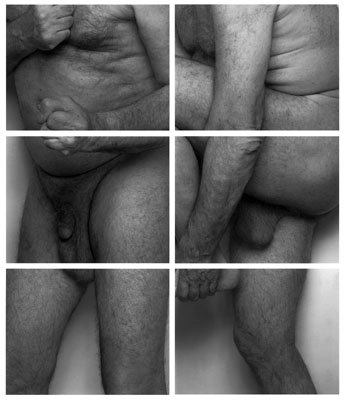John Coplans
dal 9/3/2007 al 13/4/2007
Segnalato da
9/3/2007
John Coplans
Galerie Nordenhake, Berlin
Works taken between 1984 and 2002. They consist of black and white photographs of his naked, aging body against a neutral white background. These are not, however, self-portraits in a traditional sense. He wants to present the human body as a form that cannot be fully described, only perceived.

A Legacy
Galerie Nordenhake is very pleased to present an exhibition by the artist John Coplans. In collaboration with the John Coplans Trust, the show presents works taken between 1984 and 2002. Alongside the current exhibition, Galerie Nordenhake and Amanda Means of the John Coplans Trust have organized a Reading Room in the gallery space.
John Coplans started his series of self-portraits in 1984, at the age of 64. They consist of black and white photographs of his naked, aging body against a neutral white background. These are not, however, self-portraits in a traditional sense. Coplans, for example, always excludes his head, in an attempt to eliminate any biographical, historical, or cultural narrative. He fragments the body into its individual parts and utilizes the composition of sequential montage to present the human body as a form that cannot be fully described, only perceived.
In photographs from the series 'Thumbs & Fingers', 'Fingers' or 'Feet', we loose any sense of human scale through the disproportion of the prints, creating an altered perception in the viewer. Using his body as a material like a sculptor would, he assembles, with humor, new shapes reminiscent more of animals or landscapes than a human body. Coplans engages with the sculptural perception of photography, physically implicating the viewer. The sculptor Constantin Brancusi's photographs fascinated him. Formerly three-dimensional, Brancusi's sculptures, like Coplans' body, rest on the flat surface of photographic paper, contradicting its former existence. In his famous polyptychs 'Frieze', he presents his body as split parts. There is a subtle change of scale within each segment of Coplans' multi-panels works, resulting in a disruptive visual jolt. The eye is not able to scan the image without the frame interrupting the perception of the whole. Coplans uses the photograph's frame to separate the image and isolate its formal motifs. For Coplans, form characterizes an artistic event by allowing perception, over verbal description, to take a privileged position.
In a social context of youth and beauty, he addresses how our culture views age and masculinity. With photographs enlarged to gigantic proportions, he refuses to flatter himself. He challenges the idealistic classical tradition inherited from Greek art, which created a model of physical perfection, by favoring a more realistic approach to the human body and its inevitable aging. For Coplans, the act of posing in front of the camera gives him access to a layer of forgotten memories from a long and adventurous life.
John Coplans was born in 1920 in London and passed away in New York in 2003. He grew up between London and South Africa. After the Second World War, he applied for an arts education grant and began painting. In 1957 his paintings were included in 'Metavisual, Tachiste, and Abstract Art,' the first survey of British post-war abstract art. Coplans moved to San Francisco in 1960, and began teaching basic design at the University of California, Berkeley. He was one of the founding editors of the magazine Artforum (1962) with Phil Leider and gradually became involved in art criticism. In 1963 he organized the exhibition 'Pop Art USA' at the Oakland Art Museum. Between 1965-67, he was the director of the Art Gallery, University of California, Irvine, where he organized the exhibition 'Abstract Expressionist Ceramics' and later became senior curator at the Pasadena Art Museum where he organized the exhibition 'Serial Imagery'. He curated a series of exhibitions with accompanying catalogues in 1967-1978, namely James Turrell (1967), Robert Irwin (1968), Roy Lichtenstein (1968), Andy Warhol (1970), Richard Serra (1970), Donald Judd (1971), Ellsworth Kelly (1972), and Weegee: Täter und Opfer (1978). In 1971 Coplans moved to New York to take over editorship of Artforum. Stepping down from Artforum in 1980, he became director of the Akron Art Museum in Ohio. At Akron John Coplans organized the first American exhibition of Brancusi's photographs and the first American exhibition of John Heartfield's montages. Coplans moved back to New York in 1981 and began his career in photography. He immediately received widespread acclaim, his works shown in and acquired by museums in Europe and the United States. John Coplans has exhibited with Galerie Nordenhake since 1996.
Opening reception: 6 p.m.
Galerie Nordenhake Berlin
Zimmerstr. 88-91 Berlin
Hours: Tue-Sat 11-18



